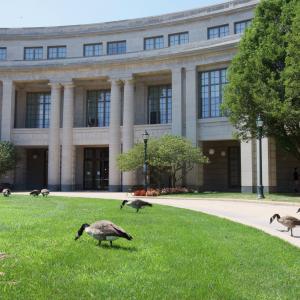Bequests 101 - Frequently Asked Questions (FAQ) About Bequests
1. What is a bequest?
A bequest is a gift that is given through your will or trust, and is a way to support a cause or organization after your lifetime. Bequests often take the form of a gift of a specific sum of money, a percentage of your estate, or a gift of other assets like property or stock.
2. How can I include a bequest in my will?
In its simplest form, you can include language stating: “I give to Case Western Reserve University, 10900 Euclid Avenue, Cleveland, Ohio 44106-7090, a Ohio nonprofit corporation, or its successor, Federal Tax Identification Number 34-1018992 [insert here the exact dollar amount].”
Whether you write your will through the university-sponsored resource FreeWill, or work directly with your attorney to add specific language to your will or trust, bequest language will outline the amount or type of gift you want to leave, and the organization you wish to support.
3. What types of bequests can I make?
- Specific Bequest: A fixed amount or particular item (e.g., $25,000 or a family heirloom).
- Residuary Bequest: A percentage of the remainder of your estate after other gifts have been made.
-
Contingent Bequest: A gift that only takes effect under certain conditions (e.g., if other beneficiaries pass away).
4. Do I need to inform the organization if I include them in my bequest?
While it is not required to inform the organization, letting the nonprofit know about your intentions allows institutions like Case Western Reserve to thank you and make sure that any intentions for your gift are properly documented for the future. Many organizations also offer recognition or membership in donor societies for those who include them in their will, including CWRU whose Luminary Society honors those who have made these meaningful gifts. Learn more about the Luminary Society.
5. Can I change my bequest after it’s been made?
Yes! A bequest can be changed or revoked at any time while you are alive. You can also amend your will by creating an addendum or drafting a new will entirely.
6. Will my bequest be taxed?
In many cases, charitable bequests are tax-exempt. However, your estate may be subject to estate taxes depending on its size and location. Consulting a tax advisor or estate planning attorney can provide clarity on how your bequest might be impacted by tax laws.
7. How can I ensure that my bequest is used according to my wishes?
It is always a good idea to specify the purpose of your bequest in your will. For example, you could designate the gift to support a scholarship fund, faculty research, or other initiatives that are important to you. It is also helpful to work with the organization to ensure they understand (and can honor) your intentions. At Case Western Reserve University, our Office of Strategic Giving often partners with each undergraduate, graduate and professional school to draft a gift agreement or Letter of Intent to memorialize gift intentions. If you’d like to start that conversation we’d be honored to have it!
Just contact the Office of Strategic Giving.
8. Can I leave a bequest for a cause or project that is important to me?
Yes! Many organizations can honor bequests that are designated for specific programs or purposes. For example, you could leave a gift to fund research in support of a disease or condition that impacted your family, or provide scholarship support for students with financial need, or perhaps support faculty initiatives in your area of collegiate study, and the list goes on!
9. How do I get started with a bequest?
It is always a good first step to consult an estate planning attorney who can guide you through the process. If you wish to include a specific organization, like CWRU, you can contact our office to discuss your options and ensure your gift is properly designated or you can try an online service like FreeWill to draft an initial will. It’s free, simple and secure.
10. What are the benefits of making a bequest?
- Leave a Legacy: A bequest allows you to make a lasting impact on a cause you care about.
- Tax Benefits: Charitable bequests can reduce the size of your taxable estate.
- Flexibility: You can change your bequest at any time, keeping it flexible according to your wishes.
For more information about estate planning or making a planned gift to Case Western Reserve, contact the Office of Strategic Giving at 216.368.4460 or visit plannedgiving.case.edu.


